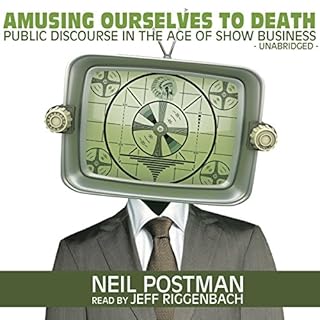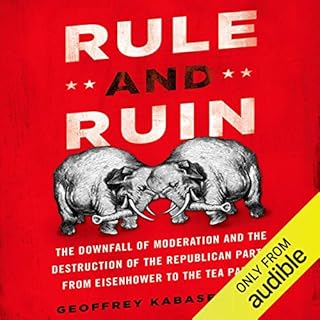Easton Reader
- 11
- reviews
- 23
- helpful votes
- 147
- ratings
-
Network of Lies
- The Epic Saga of Fox News, Donald Trump, and the Battle for America
- By: Brian Stelter
- Narrated by: Brian Stelter
- Length: 11 hrs and 41 mins
- Unabridged
-
Overall4.5 out of 5 stars 231
-
Performance4.5 out of 5 stars 214
-
Story4.5 out of 5 stars 214
In Network of Lies, New York Times bestselling author Brian Stelter answers these questions by weaving together private texts, unpublished emails, depositions, and other primary sources to tell the chilling story of Trump’s alleged conspiracy to steal the 2020 election, and the right-wing media’s mission to put him back in office in 2024.
-
5 out of 5 stars
-
Eye opener .
- By catherine weaver on 11-21-23
- Network of Lies
- The Epic Saga of Fox News, Donald Trump, and the Battle for America
- By: Brian Stelter
- Narrated by: Brian Stelter
An important story diminished by poor performance
Reviewed: 02-05-24
Brian Stetler meticulously details the disinformation and agitprop thst Fox News discharges in pursuit of ratings and profits. Unfortunately, his skills as an investigative reporter obscured by his lack of skill as a narrator. His voice is somewhat shrill and delivery is too fast and reminiscent of a televangelist. A narrator must realize that operationally, he or she is a guest in someone's home, and use a more natural, conversational tone and delivery.
Something went wrong. Please try again in a few minutes.
You voted on this review!
You reported this review!
-
Amusing Ourselves to Death
- Public Discourse in the Age of Show Business
- By: Neil Postman
- Narrated by: Jeff Riggenbach
- Length: 4 hrs and 49 mins
- Unabridged
-
Overall4.5 out of 5 stars 3,600
-
Performance4.5 out of 5 stars 3,058
-
Story4.5 out of 5 stars 3,024
In this eloquent and persuasive book, Neil Postman examines the deep and broad effects of television culture on the manner in which we conduct our public affairs, and how "entertainment values" have corrupted the very way we think. As politics, news, religion, education, and commerce are given less and less expression in the form of the printed word, they are rapidly being reshaped to suit the requirements of television.
-
5 out of 5 stars
-
Excellent Content Read at Warp Speed
- By chaoticmuse on 03-17-11
- Amusing Ourselves to Death
- Public Discourse in the Age of Show Business
- By: Neil Postman
- Narrated by: Jeff Riggenbach
Valuable analysis ruined by a speed reader
Reviewed: 05-20-22
Neil Postman’s thoughtful analysis of contemporary US society and the influence of visual entertainment media has been made incomprehensible and headache inducing by the narrator’s attempt to break the land speed record in talking. M
Something went wrong. Please try again in a few minutes.
You voted on this review!
You reported this review!
-
Donald Trump v. The United States
- Inside the Struggle to Stop a President
- By: Michael S. Schmidt
- Narrated by: Michael S. Schmidt
- Length: 14 hrs and 57 mins
- Unabridged
-
Overall4.5 out of 5 stars 1,003
-
Performance4.5 out of 5 stars 887
-
Story4.5 out of 5 stars 880
Donald Trump v. The United States tells the dramatic story of those who felt compelled to confront and try to contain the most powerful man in the world as he shredded norms and sought to expand his power. Michael S. Schmidt takes listeners inside the defining events of the presidency, chronicles them up close, and records the clash between an increasingly emboldened president and those around him, who find themselves trying to thwart the president they had pledged to serve, unsure whether he is acting in the interest of the country, his ego, his family business, or Russia.
-
4 out of 5 stars
-
OMG THE NARRATOR
- By megan on 09-03-20
- Donald Trump v. The United States
- Inside the Struggle to Stop a President
- By: Michael S. Schmidt
- Narrated by: Michael S. Schmidt
Superb detail & analysis marred by author's voice
Reviewed: 12-08-20
Schmidt offers a meticulous account with detailed background information about major participants involved the Trump presidency (better termed a kakistocracy). Schmidt, however, lack a pleasing voice or manner of delivery and diminishes the effect.
Something went wrong. Please try again in a few minutes.
You voted on this review!
You reported this review!
-
Spillover
- By: David Quammen
- Narrated by: Jonathan Yen
- Length: 20 hrs and 47 mins
- Unabridged
-
Overall4.5 out of 5 stars 1,845
-
Performance4.5 out of 5 stars 1,581
-
Story4.5 out of 5 stars 1,577
The emergence of strange new diseases is a frightening problem that seems to be getting worse. In this age of speedy travel, it threatens a worldwide pandemic. We hear news reports of Ebola, SARS, AIDS, and something called Hendra killing horses and people in Australia - but those reports miss the big truth that such phenomena are part of a single pattern. The bugs that transmit these diseases share one thing: they originate in wild animals and pass to humans by a process called spillover. David Quammen tracks this subject around the world.
-
4 out of 5 stars
-
Fascinating, but not Riveting
- By L. M. Roberts on 03-08-14
- Spillover
- By: David Quammen
- Narrated by: Jonathan Yen
A fascinating and timely narrative
Reviewed: 05-15-20
This book, deservedly a New York Times best seller, is a page-turning account of the emerging and recurring infections that plague (literally) human civilization. As civilization encroaches on wilderness and as climate wreaks havoc on ecosystems microorganisms and viruses located habituated and isolated will come into contact with new, naive hosts often with devastating consequences.
The narrator has pleasant voices and paces his delivery well. The only criticism that may be raised is his occasional idiosyncratic pronunciation. For example, he says "zo-ON-osis" instead of "ZO-o-nosis"; "as-SAY" instead of "AS-say", and "fal-ci-PAR-um instead of "fal- CIP-arum."
Something went wrong. Please try again in a few minutes.
You voted on this review!
You reported this review!
-
The Moral Arc
- How Science and Reason Lead Humanity Toward Truth, Justice, and Freedom
- By: Michael Shermer
- Narrated by: Michael Shermer, Melody Zownir
- Length: 19 hrs and 54 mins
- Unabridged
-
Overall4.5 out of 5 stars 427
-
Performance4.5 out of 5 stars 374
-
Story4.5 out of 5 stars 371
We are living in the most moral period of our species’ history. Best-selling author Michael Shermer’s most accomplished and ambitious book to date demonstrates how the scientific way of thinking has made people, and society as a whole, more moral. Ever since the Age of Reason and the Enlightenment thinkers consciously applied the methods of science to solve social and moral problems.
-
3 out of 5 stars
-
Us is getting bigger, them is getting smaller
- By Gary on 02-02-15
- The Moral Arc
- How Science and Reason Lead Humanity Toward Truth, Justice, and Freedom
- By: Michael Shermer
- Narrated by: Michael Shermer, Melody Zownir
A well-researched analysis of human development
Reviewed: 07-20-17
Would you recommend this audiobook to a friend? If so, why?
Yes
What did you like best about this story?
Historical perspective
Did Michael Shermer and Melody Zownir do a good job differentiating all the characters? How?
yes
Did you have an extreme reaction to this book? Did it make you laugh or cry?
No
Any additional comments?
I did not care for Michael Schermer's style of narration which sounded like he was reading from a script, which of course he was. A good narrator, however, makes the listener feel as if he's in an initmate conversaton.
Something went wrong. Please try again in a few minutes.
You voted on this review!
You reported this review!
1 person found this helpful
-
The Irony of American History
- By: Reinhold Niebuhr
- Narrated by: Robert Blumenfeld
- Length: 5 hrs and 39 mins
- Unabridged
-
Overall4 out of 5 stars 194
-
Performance4 out of 5 stars 146
-
Story4.5 out of 5 stars 147
Forged during the tumultuous but triumphant postwar years when America came of age as a world power, The Irony of American History is more relevant now than ever before. Cited by politicians as diverse as Hillary Clinton and John McCain, Niebuhr's masterpiece on the incongruity between personal ideals and political reality is both an indictment of American moral complacency and a warning against the arrogance of virtue.
-
5 out of 5 stars
-
Superlative Book
- By Amazon Customer on 01-29-10
- The Irony of American History
- By: Reinhold Niebuhr
- Narrated by: Robert Blumenfeld
Important prespectives from a respected scholar
Reviewed: 03-28-17
Where does The Irony of American History rank among all the audiobooks you’ve listened to so far?
It ranks among the lower half. In the book, published in the early 1950's contains references to events current at that time, but long since past. The author's comments about "the oriental" viewpoints seem vastly oversimplified as he lumps together the different cultures of India, China, and Japan.
What didn’t you like about Robert Blumenfeld’s performance?
Robert Blumenfeld's performance was the weak point of this audiobook for two reasons. First, he spoke too quickly making it difficult to consider the important points the author was making. Second, the narrator spoke as if he was delivering a sermon to a large assembly. A more conversational delivery as one would expect from a guest in one's home would have been more effective
Something went wrong. Please try again in a few minutes.
You voted on this review!
You reported this review!
1 person found this helpful
-
Retribution
- The Battle for Japan, 1944 - 45
- By: Max Hastings
- Narrated by: Simon Vance
- Length: 27 hrs and 41 mins
- Unabridged
-
Overall5 out of 5 stars 686
-
Performance5 out of 5 stars 612
-
Story5 out of 5 stars 602
In his critically acclaimed Armageddon, Hastings detailed the last twelve months of the struggle for Germany. Here, in what can be considered a companion volume, he covers the horrific story of the war against Japan. By the summer of 1944 it was clear that Japan’s defeat was inevitable, but how the drive to victory would be achieved remained to be seen. The ensuing drama–that ended in Japan’s utter devastation–was acted out across the vast stage of Asia.
-
5 out of 5 stars
-
A superb study by one of the world's finest histor
- By Easton Reader on 12-22-16
- Retribution
- The Battle for Japan, 1944 - 45
- By: Max Hastings
- Narrated by: Simon Vance
A superb study by one of the world's finest histor
Reviewed: 12-22-16
Where does Retribution rank among all the audiobooks you’ve listened to so far?
Among the top 5
What was one of the most memorable moments of Retribution?
Discussion of Japanese behavior in China and Philippines
Which scene was your favorite?
Battle for Manila
Was this a book you wanted to listen to all in one sitting?
no
Any additional comments?
Simon Vance is one of my favorite narrators. His clear diction, pacing, and intonation convey the author's intentions perfectly. Like many English speakers, however, his pronunciation of Japanese proper names is sometimes incorrect. For example, the name "Yamashita" is not pronounced as "Ya-ma-she-ta" it is pronounced as "Ya-ma-sh'ta;" "Yoshiko" is not "Yo-she-ko" it is "Yo-sh'ko;" and the two famous cities. Tokyo and Kyoto are pronounced as two syllables, not three: not "To-key-oh" but "To-quo" and not "Key-oh-to" but "Quo-to."
Something went wrong. Please try again in a few minutes.
You voted on this review!
You reported this review!
12 people found this helpful

-
Why America Failed: The Roots of Imperial Decline
- By: Morris Berman
- Narrated by: Mark Bramhall
- Length: 7 hrs and 19 mins
- Unabridged
-
Overall4.5 out of 5 stars 53
-
Performance4.5 out of 5 stars 48
-
Story4.5 out of 5 stars 47
In his most ambitious work to date, Morris Berman looks at the "why" of American decline. This book probes America's commitment to economic liberalism and free enterprise, stretching back to the late 16th century, and shows how this ideology, along with that of technological progress, rendered any alternative marginal to American history. Berman maintains, more than anything else, that this one-sided vision of the country's purpose finally did our nation in.
-
3 out of 5 stars
-
Some truth. And a lot of nonsense.
- By Ted on 02-02-15
- Why America Failed: The Roots of Imperial Decline
- By: Morris Berman
- Narrated by: Mark Bramhall
Why America Failed: A Luddite's Lament
Reviewed: 09-27-16
What could have made this a 4 or 5-star listening experience for you?
Nothing: the author's premise that the reason "Why America Failed" is technology and progress is utter nonsense.
What do you think your next listen will be?
A Storm in Flanders
What does Mark Bramhall bring to the story that you wouldn’t experience if you just read the book?
The narrator gave a superb performance, expressing not only the author's thoughts but also his feelings and attitudes
What character would you cut from Why America Failed: The Roots of Imperial Decline?
Not applicable to this book
Any additional comments?
Morris Berman analysis of the current state of US diagnoses the cause as hustling with which he believes was established by the country's founding. The financial collapse in 2008 provides him with abundant ammunition, and clearly, some criminal intent was present in the credit default swaps and other swindles perpetrated by Goldman-Sachs and other financial institutions. The author, however, lacks the clarity that Matt Taibbi used so effectively in his vastly superior bookGriftopia: A Story of Bankers, Politicians, and the Most Audacious Power Grab in American History. Even before 2008 there indeed problems that have caused wage stagnation and massive accumulation of wealth by a small number of individuals.
Where Berman's argument completely derails, however, is in attributing the underlying cause of endemic swindling to technology and progress. While acknowledging that Unabomber Ted Kaczynski assassinated or maimed several innocent people, Berman's main complaint is that in his manifesto Kaczynski's writing is "sophomoric" and badly in need of an editor. The Anti-Bellum South, Berman asserts, was a truly genteel society that valued contemplation and honor completely unlike the ruthlessly aggressive North that steamrolled over everything in its way. While paying lip service to the fact slavery was abusive and immoral, he seems to discount that fact that it was the exploitation of other human beings that enabled the anti-Bellum Southern gentlemen to pursue a life of relaxed contemplation. Criticism is directed at Abraham Lincoln whom the author notes worked to improve transportation in his state, and thus a force for progress and technology.
The author cites the reading a document on a computer monitor elevates dopamine, cortisol, and causes decreased ability to critically analyze. Worse still is multi-tasking which he believes results in impaired reasoning. In different chapters, Berman bemoans that thousands live alone, then seems to contradict himself by asserting that technology in the form of iPhone and iPads deprives people of solitude. Berman categorically rejects the idea that technology is a tool that can be used or misused: he regards technology and progress as essentially evil.
Not surprisingl, Berman concludes that the US is hopeless and doomed. The problems that current grip the US are serious and may not be corrected in the fullness of time, but not the direct result of technological progress. Nowhere in his screed does Berman mention the bloated military budget, the over-extended imperium with at least 900 known bases in foreign countries and an unknown number of covert sites, a non-functioning congress, and a substandard educational system.
Something went wrong. Please try again in a few minutes.
You voted on this review!
You reported this review!
2 people found this helpful
-
Rule and Ruin
- The Downfall of Moderation and the Destruction of the Republican Party, from Eisenhower to the Tea Party
- By: Geoffrey Kabaservice
- Narrated by: Michael Bulter Murray
- Length: 21 hrs and 12 mins
- Unabridged
-
Overall4.5 out of 5 stars 63
-
Performance4 out of 5 stars 57
-
Story4.5 out of 5 stars 55
The chaotic events leading up to Mitt Romney's defeat in the 2012 election indicated how far the Republican Party had rocketed rightward away from the center of public opinion. Republicans in Congress threatened to shut down the government and force a U.S. debt default. Tea Party activists mounted primary challenges against Republican officeholders who appeared to exhibit too much pragmatism or independence. Moderation and compromise were dirty words in the Republican presidential debates. The GOP, it seemed, had suddenly become a party of ideological purity. Except this development is not new at all.
-
5 out of 5 stars
-
Kabaservice doesn't make the case
- By MJE on 01-22-16
- Rule and Ruin
- The Downfall of Moderation and the Destruction of the Republican Party, from Eisenhower to the Tea Party
- By: Geoffrey Kabaservice
- Narrated by: Michael Bulter Murray
Excellent and important history and insightful discussion
Reviewed: 03-05-16
This is a fairly thorough discussion of the history, causes, and consequences of the right-wing seizure of the Republican Party from Eisenhower to the present.
Narration is excellent except for a few mispronunciations.
Highly recommended.
Something went wrong. Please try again in a few minutes.
You voted on this review!
You reported this review!
1 person found this helpful
-
The Devil That Never Dies
- The Rise and Threat of Global Antisemitism
- By: Daniel Jonah Goldhagen
- Narrated by: Kevin T. Collins
- Length: 22 hrs and 58 mins
- Unabridged
-
Overall4 out of 5 stars 28
-
Performance4.5 out of 5 stars 25
-
Story4 out of 5 stars 25
Antisemitism never went away, but since the turn of the century it has multiplied beyond what anyone would have predicted. In The Devil That Never Dies, Daniel Jonah Goldhagen reveals the unprecedented, global form of this age-old hatred; its strategic use by states; its powerful appeal to individuals and groups; and how technology has fueled the flames that had been smoldering prior to the millennium.
-
4 out of 5 stars
-
Devastating, despite a few flaws
- By Adam S. Glantz on 02-19-16
- The Devil That Never Dies
- The Rise and Threat of Global Antisemitism
- By: Daniel Jonah Goldhagen
- Narrated by: Kevin T. Collins
Confusing and repititious
Reviewed: 12-05-15
What did you like best about The Devil That Never Dies? What did you like least?
The best feature was that Goldhagen traces the history of antisemitism from the earliest times up to present. Goldhagen's writing, however was poor: repetitious both in terms of wording and topics, and confusing. I was not able to listen to the entire book. It was making me antisemitic - and I'm Jewish! I want my credit back!
What do you think your next listen will be?
The Drive on Moscow, 1941: Operation Taifun and Germany’s First Great Crisis of World War II
What does Kevin T. Collins bring to the story that you wouldn’t experience if you just read the book?
The narration made it easier to follow
If this book were a movie would you go see it?
No
Something went wrong. Please try again in a few minutes.
You voted on this review!
You reported this review!









